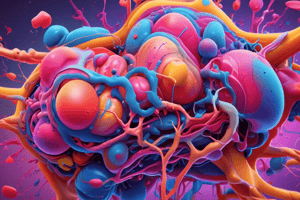Podcast
Questions and Answers
What is this drug associated with this class? (Select all that apply)
What is this drug associated with this class? (Select all that apply)
- Adenosine (correct)
- Digoxin (correct)
- Ibuprofen
- Aspirin
What is the mechanism of action of adenosine?
What is the mechanism of action of adenosine?
Terminates PSVT by blocking SA and AV nodes
What is the use of adenosine?
What is the use of adenosine?
Converts supraventricular tachycardia to normal sinus rhythm
What are the common adverse effects of adenosine?
What are the common adverse effects of adenosine?
How is adenosine administered?
How is adenosine administered?
What is the mechanism of action of digoxin?
What is the mechanism of action of digoxin?
What is the common adverse effect of digoxin?
What is the common adverse effect of digoxin?
What are the serious adverse effects associated with digoxin?
What are the serious adverse effects associated with digoxin?
What does digoxin treat?
What does digoxin treat?
Flashcards are hidden until you start studying
Study Notes
Class V: Other Anti-arrhythmic Agents
- Key drugs include adenosine and digoxin.
Mechanism of Action
- Adenosine terminates paroxysmal supraventricular tachycardia (PSVT) by blocking signal conduction in the sinoatrial (SA) and atrioventricular (AV) nodes.
- Digoxin slows AV node conduction, reducing conduction velocity and automaticity, while also increasing cardiac output.
Use of Adenosine
- Adenosine is primarily used to convert supraventricular tachycardia to normal sinus rhythm.
Adverse Effects of Adenosine
- Common side effects include flushing of the face, shortness of breath, chest pressure, nausea, and headache.
Administration of Adenosine
- Administered intravenously at a dose of 6mg via rapid bolus injection (within 1 to 2 seconds), followed by a saline flush. If effective, a subsequent dose of 12mg may be given.
Adverse Effects of Digoxin
- Common side effects include nausea, vomiting, diarrhea, loss of appetite, bradycardia, arrhythmias, dizziness, confusion, fatigue, and blurred or altered vision (yellow/green).
Serious Adverse Effects of Digoxin
- Severe bradycardia and arrhythmias, along with central nervous system effects, may occur.
Indications for Digoxin
- Digoxin is used to treat atrial fibrillation, atrial flutter, and paroxysmal tachycardia.
Studying That Suits You
Use AI to generate personalized quizzes and flashcards to suit your learning preferences.




